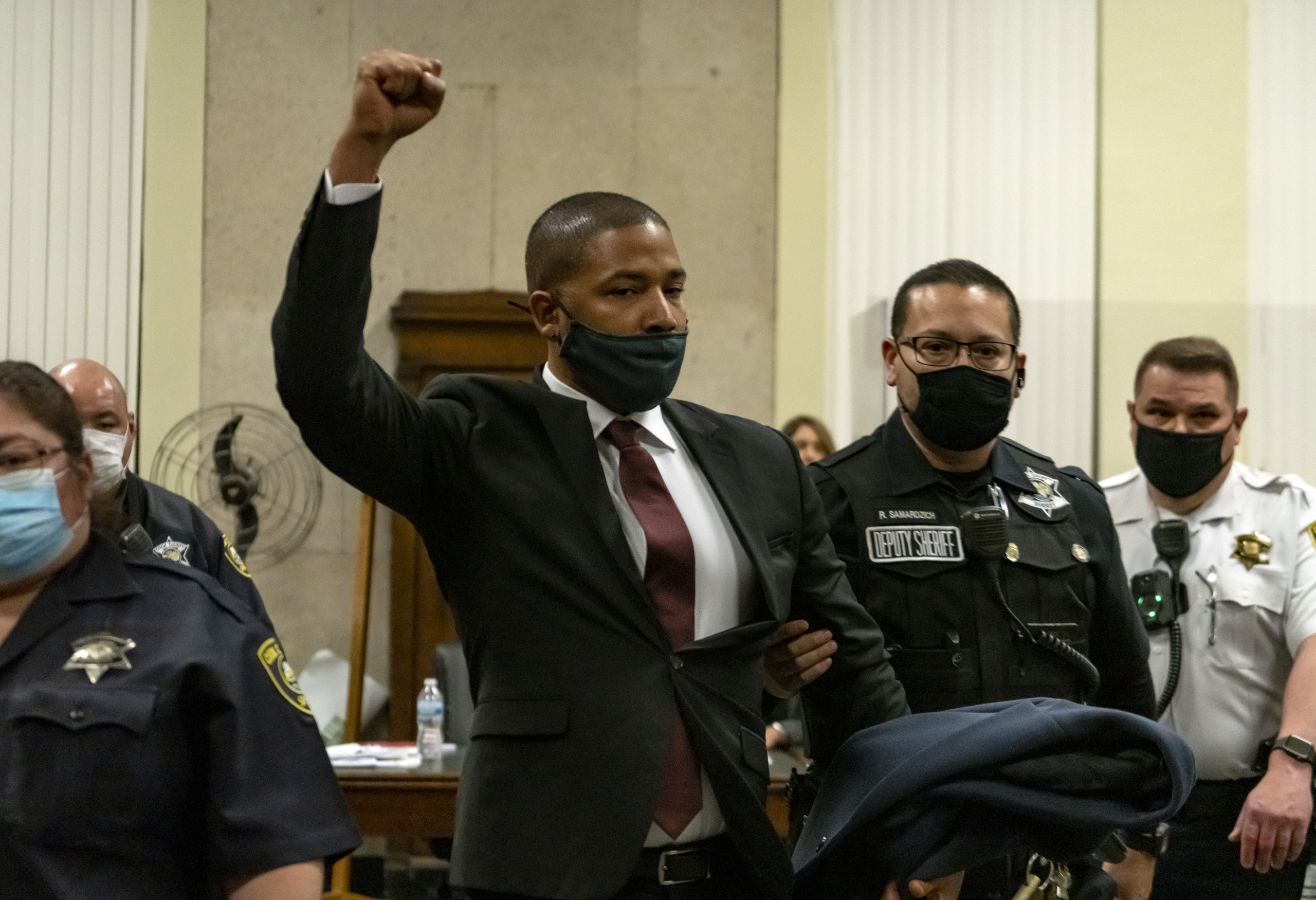After an hours-long sentencing hearing, actor Jussie Smollett received the maximum fine for a class 4 felony in Illinois, $25,000; the maximum amount of felony probation, 30 months; restitution of $120,126; and 150 days in the Cook County Jail. He was ordered to begin serving his sentence immediately and responded by repeatedly shouting out that he was not suicidal, and also that he was innocent.
Smollett was convicted in December 2021 of five counts of disorderly conduct, related to filing false police reports. Those reports included claims he had been assaulted in a racially-motivated hate crime, though the evidence later suggested he had orchestrated the attack himself as part of a hoax to boost his career and public profile. Join Liberty Nation Legal Affairs Editor Scott D. Cosenza, Esq. and Editor at Large James Fite for a Q&A session on what to make of the hearing, testimony, and eventual fate of Mr. Smollett.

(Photo by Brian Cassella-Pool/Getty Images)
James Fite: Judge James Linn and the prosecution both mentioned the repeated lying from Smollett, who proclaimed his innocence even to the time he walked out of the courtroom. More specifically, they commented on how the actor committed the crime of perjury. Someone who denies guilt can’t really demonstrate contrition. Do you believe that continued defiance had much bearing on the sentence?
Scott D. Cosenza, Esq.: It’s as you say. A person maintaining actual innocence simply cannot by definition be contrite. I think the only thing that could have saved Mr. Smollett from a custodial sentence was contrition and apology. It didn’t help the defendant that the evidence against him was overwhelming.
JF: If a defendant is innocent, then denying a charge isn’t lying, and it’s unfair to hold it against him. However, if the conviction is proof of guilt, then continuing to deny the charge is lying, legally speaking. How does one balance this, and how much weight did and should the judge give to the defendant’s continued denials of guilt?
SDC: Remember that the state cannot compel a criminal defendant to testify. It’s not like those in a criminal trial must choose between confession now or a perjury sentence later. Smollett could have said nothing. Instead, according to the jury, he chose to double down on the lies in court on the witness stand. Those are the lies that enhanced this sentence, not Jussie Smollett’s refusal to accept responsibility publicly. The judge seemed to give substantial weight to these misdeeds, as is his discretion.
JF: Numerous people spoke for Mr. Smollett, and while each said something a little different, there were some common threads: Jussie Smollett has suffered enough already, the whole case is impacted by racism, and Smollett is worth more to the community as a free man than a prisoner. Some were delivered angrily, and others as political speeches worthy of the campaign trail. Did the character witnesses and supporters help the actor’s cause or hinder it?
SDC: I was shocked to see those messages delivered because I don’t think they are helpful for Smollett. Accusing others of wrongdoing or referring to systematic ills are not likely to motivate a judge to impose a lower sentence. Better to put the message out that the defendant is a good person who did a bad thing.
 JF: How much weight in the sentencing decision do judges tend to give things like reputational harm and the lost income that comes from either being incarcerated or simply losing one’s job after news of a criminal charge spreads? Do you believe this was a factor in Mr. Smollett’s case?
JF: How much weight in the sentencing decision do judges tend to give things like reputational harm and the lost income that comes from either being incarcerated or simply losing one’s job after news of a criminal charge spreads? Do you believe this was a factor in Mr. Smollett’s case?
SDC: The judge said the difficulties Jussie Smollett brought on himself were far worse than the punishment the court would deliver. That tells us that he did consider it.
JF: Finally, the defense made it clear an appeal is on the way. Do you think Mr. Smollett’s reaction at the end of the hearing will affect a future appeal, and if so, how?
SDC: No. His outburst was good for headlines and perhaps even driven by genuine fear. It was, as courtroom outbursts go, relatively tame and will not be a factor in his appeal.
~ Read more from Scott D. Cosenza, Esq. and James Fite.




